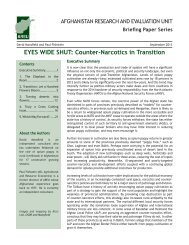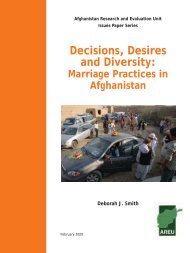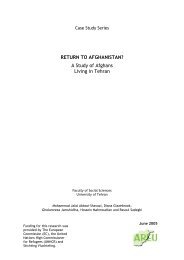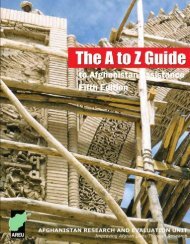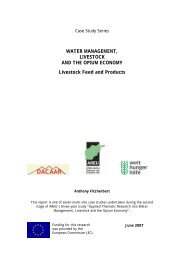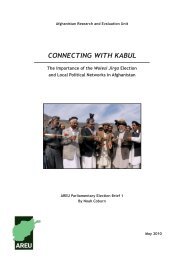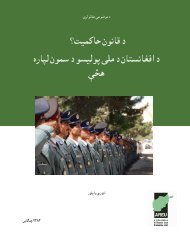Local Governance in Afghanistan: A View from the Ground
Local Governance in Afghanistan: A View from the Ground
Local Governance in Afghanistan: A View from the Ground
- No tags were found...
Create successful ePaper yourself
Turn your PDF publications into a flip-book with our unique Google optimized e-Paper software.
<strong>Afghanistan</strong> Research and Evaluation Unit<br />
2011<br />
majority of <strong>the</strong> prov<strong>in</strong>ces of this study central government was seen as weak with limited ability to<br />
enforce its diktat. The state, <strong>in</strong> <strong>the</strong> person of <strong>the</strong> president, is clearly anxious to ma<strong>in</strong>ta<strong>in</strong> control<br />
and avoid <strong>the</strong> spectre of fragmentation. It is thus probably unrealistic to expect President Karzai and<br />
his advisors to allow powers of appo<strong>in</strong>tment over key adm<strong>in</strong>istrative posts—and <strong>the</strong> allegiances <strong>the</strong>se<br />
secure—to slip <strong>from</strong> <strong>the</strong>ir grasp. This is especially <strong>the</strong> case given cont<strong>in</strong>u<strong>in</strong>g <strong>in</strong>stability <strong>in</strong> <strong>the</strong> country<br />
and <strong>the</strong> consequent lack of certa<strong>in</strong>ty about how government will evolve.<br />
There is a grow<strong>in</strong>g recognition of <strong>the</strong> need for decentralisation, as was noted <strong>in</strong> one important study:<br />
Foster<strong>in</strong>g a transparent, purposeful and decentralised public adm<strong>in</strong>istration—<strong>in</strong>itially to be<br />
focused exclusively upon transparent, locally-accountable service delivery <strong>in</strong> collaboration with<br />
CBOs, traditional councils and leaders...will do a great deal to build <strong>the</strong> State’s legitimacy and<br />
counter <strong>the</strong> fragmentation which is currently tak<strong>in</strong>g place. 114<br />
Indeed, <strong>the</strong> need for a more determ<strong>in</strong>ed approach to decentralisation was clearly acknowledged by<br />
<strong>the</strong> <strong>in</strong>ternational community and <strong>the</strong> current government at <strong>the</strong> 2010 London Conference: “...<strong>in</strong> <strong>the</strong><br />
com<strong>in</strong>g years <strong>the</strong> government will establish elected village, district and municipality councils, and<br />
conduct mayoral elections, which will expand participatory governance at all levels.” 115 S<strong>in</strong>ce <strong>the</strong><br />
Afghan constitution prevents <strong>the</strong> <strong>in</strong>cumbent <strong>from</strong> stand<strong>in</strong>g for a third term, <strong>the</strong>re is an opportunity<br />
for <strong>the</strong> government and <strong>the</strong> <strong>in</strong>ternational community to use <strong>the</strong> 2014 presidential elections as an<br />
opportunity to push <strong>the</strong> decentralisation agenda forward. However, this assumes that President<br />
Karzai will not want his successor to enjoy his current wide-rang<strong>in</strong>g powers, that <strong>the</strong> <strong>in</strong>ternational<br />
community and local actors will be able to prevent any amendment to <strong>the</strong> constitution that extends<br />
presidential term limits, 116 and that <strong>the</strong>re is <strong>the</strong> political will among both donors and Afghan<br />
constituencies to see a more decentralised state.<br />
Representative bodies<br />
Representative bodies form <strong>the</strong> second element of formal governance <strong>in</strong> <strong>the</strong> country, hold<strong>in</strong>g <strong>the</strong><br />
executive to account and answer<strong>in</strong>g to those that elect <strong>the</strong>m. An exam<strong>in</strong>ation of procedures, policy<br />
documents and draft legislation reveals <strong>the</strong> state is extremely reluctant to devolve powers to such<br />
bodies <strong>in</strong> any mean<strong>in</strong>gful way. The Subnational <strong>Governance</strong> Policy 117 frequently refers to <strong>the</strong> notion of<br />
“participatory” governance, along with “partnership” 118 between bodies such as prov<strong>in</strong>cial councils<br />
and <strong>the</strong> government; however, “participation” implies nei<strong>the</strong>r responsibility nor accountability. It is<br />
a notion far removed <strong>from</strong> scrut<strong>in</strong>y and oversight. Accord<strong>in</strong>g to <strong>the</strong> draft Prov<strong>in</strong>cial Council Law (<strong>the</strong><br />
District law is similar), <strong>the</strong> council has a role of advis<strong>in</strong>g <strong>the</strong> prov<strong>in</strong>cial adm<strong>in</strong>istration (Art. 10.1) and<br />
must be <strong>in</strong>formed and consulted on <strong>the</strong> Prov<strong>in</strong>cial Development Plan and budget (Art.10.2), which it<br />
may reject giv<strong>in</strong>g written reasons. The prov<strong>in</strong>cial council may request <strong>the</strong> wali and l<strong>in</strong>e department<br />
heads to attend <strong>the</strong>ir meet<strong>in</strong>gs to answer questions. The law also states that <strong>the</strong> prov<strong>in</strong>cial council<br />
“shall hold <strong>the</strong> Prov<strong>in</strong>cial Adm<strong>in</strong>istration accountable” 119 but provides no mechanism for achiev<strong>in</strong>g<br />
this. While prov<strong>in</strong>cial council reports go to <strong>the</strong> Wolesi Jirga and Meshrano Jirga, <strong>the</strong>y are first passed<br />
through IDLG and, as far as some prov<strong>in</strong>cial council members are concerned, this is where <strong>the</strong> cha<strong>in</strong><br />
of accountability ends. However, o<strong>the</strong>r councilors were unhappy with <strong>the</strong>se report<strong>in</strong>g l<strong>in</strong>es s<strong>in</strong>ce <strong>the</strong>y<br />
prevented <strong>the</strong>m <strong>from</strong> provid<strong>in</strong>g an adequate check upon <strong>the</strong> executive. The draft legislation only offers<br />
prov<strong>in</strong>cial councils—and <strong>the</strong> future district councils—limited rights of oversight and participation <strong>in</strong><br />
plann<strong>in</strong>g. They have no powers o<strong>the</strong>r than that of recommendation, and no obligations o<strong>the</strong>r than<br />
that of dispute resolution (to be discussed below).<br />
114 Sultan Barakat, “Understand<strong>in</strong>g <strong>Afghanistan</strong>” (York: Post-War Reconstruction & Development Unit, University of York, 2008).<br />
115 “<strong>Afghanistan</strong> London Conference Communiqué” (Kabul: Government of <strong>Afghanistan</strong>, 2010), 51.<br />
116 The new Wolesi Jirga elected <strong>in</strong> 2010 <strong>in</strong>cludes a number of Karzai’s political rivals, or those l<strong>in</strong>ked to <strong>the</strong>m, and this<br />
will reduce <strong>the</strong> likelihood of any constitutional amendment be<strong>in</strong>g pushed through <strong>the</strong> house to allow an <strong>in</strong>cumbent to serve<br />
a third term as president.<br />
117 “Executive Summary.”<br />
118 “Executive Summary,” 6.<br />
119 See Article 12 <strong>in</strong> <strong>the</strong> Draft Prov<strong>in</strong>cial Council Law (2010).<br />
<strong>Local</strong> <strong>Governance</strong> <strong>in</strong> <strong>Afghanistan</strong>: A <strong>View</strong> <strong>from</strong> <strong>the</strong> <strong>Ground</strong><br />
54



